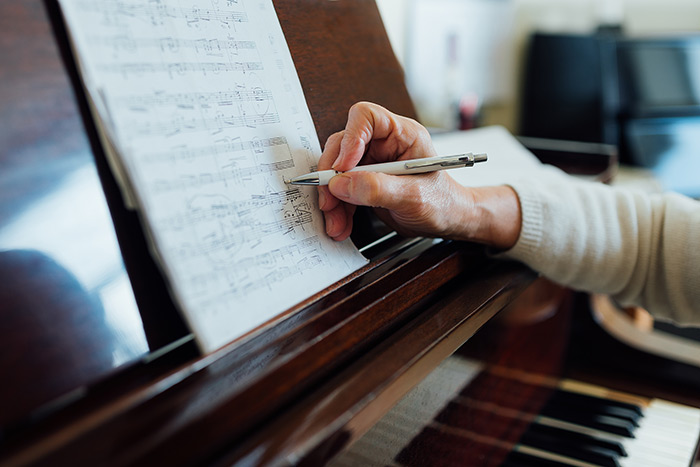Exploring the world of piano playing is not only about enjoying the music but also about steering clear of common mistakes that could hinder your progress.
Playing the piano offers opportunities for personal expression and delight, and being mindful of typical errors is crucial for speeding up your learning journey.
Many piano learners face the challenge of seeking quick results, leading them to skip what may appear unnecessary.
However, this shortcut often results in the development of undesirable habits that can be challenging to break later on.
Avoiding these pitfalls is essential for a more enjoyable and efficient piano learning experience.
Here are five common mistakes to avoid when learning the piano:

1. Skipping the Basics
Skipping over the foundational basics is a common misstep that beginners often make when embarking on their piano learning journey.
The eagerness to dive into playing favourite songs may lead to overlooking the essential building blocks necessary for a strong and sustainable musical foundation.
To ensure a more robust learning experience, it is crucial to invest time in mastering fundamental aspects such as proper hand positioning, finger technique, and music theory.
Delve into the intricacies of these basics, understanding how they form the bedrock of proficient piano playing. Starting with straightforward exercises provides a gradual yet solid introduction to these concepts.
As you become more adept, progress to more complex pieces, allowing for a seamless and enjoyable evolution in your piano-playing skills.
By taking a patient and comprehensive approach to mastering the basics, you lay the groundwork for a more rewarding and successful musical journey.
2. Neglecting Practise
Neglecting the importance of regular practise poses a significant hurdle in the journey of learning to play the piano.
The inconsistency or inadequacy of practise sessions can become a roadblock, hindering the development of essential aspects like muscle memory and overall skill enhancement crucial for piano playing.
To overcome this challenge, it is highly advisable to establish a consistent and structured practise routine. Creating a habit of regular practise is essential, and setting achievable goals for each session adds a sense of direction to your learning journey.
It’s more effective to practise daily, even if only for a short duration, rather than opting for sporadic and prolonged sessions.
This approach not only aids in the gradual improvement of skills but also fosters a more sustainable and rewarding progression in your piano-playing endeavours.
Embracing a disciplined practise routine becomes the key to unlocking your full potential and enjoying a more fulfilling musical experience.

3. Ignoring Music Theory
Failing to give due attention to music theory is a common oversight among beginners in the realm of piano playing.
Rather than delving into the fundamentals of music theory, some individuals solely rely on playing by ear or memorising songs, missing out on the enriching benefits that a foundational understanding of music theory can offer.
To enhance your musical journey, it’s highly recommended to engage with music theory basics, including scales, chords, key signatures, and time signatures.
Familiarising yourself with these fundamental elements provides a solid framework for comprehending and interpreting music more effectively.
Embracing music theory is akin to unlocking a treasure trove of insights that can elevate your playing skills and deepen your appreciation for the art of piano.
By incorporating these essential components into your learning process, you not only enhance your musical proficiency but also set the stage for a more fulfilling and well-rounded piano-playing experience.
4. Playing Too Fast
Mastering the piano involves a strategic approach to tempo, particularly avoiding the common pitfall of attempting full-speed renditions too soon.
Many learners face frustration and errors when rushing this process. To mitigate these challenges, it’s advisable to initiate practise sessions at a deliberately slower tempo.
This deliberate pacing enhances accuracy and control, providing a solid foundation for mastering each element of a musical piece.
Starting slow allows for focused learning and ensures a strong connection between skills and the composition. As familiarity and confidence grow, gradually increasing the speed becomes a natural progression.
This method minimises mistakes, fosters a sense of accomplishment, and contributes to an overall more satisfying piano-playing experience.
The patient and measured approach to tempo sets the stage for a smoother musical journey, allowing learners to navigate challenges effectively and derive greater joy from their progress.
5. Neglecting Proper Posture and Technique
Overlooking the importance of maintaining proper posture and technique while playing the piano can have significant consequences, ranging from discomfort to potential injury.
Poor posture and hand technique often lead to strain on muscles and joints, impacting the overall playing experience.
To address this concern, it is crucial to prioritise posture awareness and implement effective hand and wrist positions during practise sessions.
To ensure a comfortable and injury-free piano-playing journey, pay careful attention to your posture. Sit with proper alignment, keeping your back straight and shoulders relaxed.
Additionally, focus on maintaining a relaxed hand and wrist position to prevent unnecessary tension.
Seeking guidance from a qualified instructor can be immensely beneficial, as they can provide personalised feedback and corrections to ensure you are using the correct techniques.
Investing time in these foundational aspects contributes not only to your well-being but also to the longevity of your piano-playing endeavours.

Want to Stop Making These Mistakes?
To get better at playing the piano, write down the parts you find hard and keep the notes on your piano.
Taking lessons can also help you learn the right way and fix any mistakes.
Remember, learning the piano takes time, so be patient!
Celebrate the small things you learn, and don’t get upset if it’s tricky sometimes.
If possible, get a piano teacher to help you personally. If you want to start learning or improve, you can take lessons with us at S & C Music.
Are you not in Dubai and still want to learn how to play the piano? You can also study with us online via Online Piano Institute.
Find more details about our online piano lessons here.
Contact us to find out more and sign up for your first lesson!







